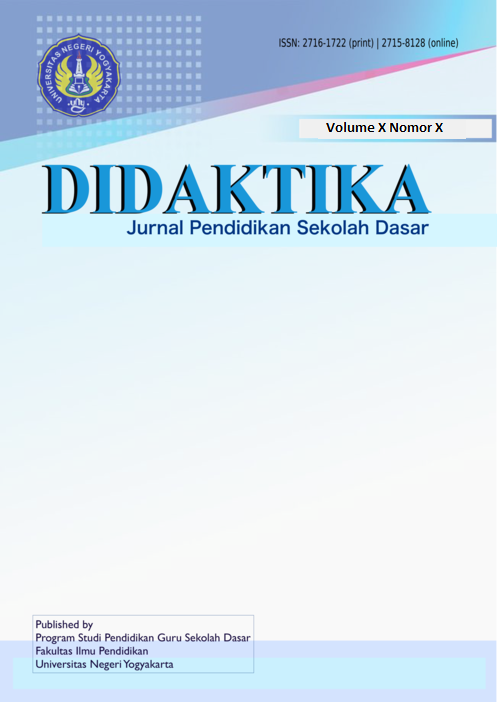Pengaruh Model Kooperatif Tipe Think Pair Share (TPS) Terhadap Keaktifan Siswa Pada Mata Pelajaran Ipa Materi Kalor Dan Wujud Benda
DOI:
https://doi.org/10.21831/didaktika.v7i2.76492Abstract
References
Amruddin 2022. Metode Penelitian Kuantitatif. sukoharjo: pradina pustaka.
Bella Putri Zain, R.A. 2021. Pengaruh Model Kooperatif Tipe Think Pair Share terhadap Motivasi dan Kemampuan Komunikasi Matematis Siswa Sekolah Dasar. Jurnal Basicedu, 5(5): 3668–3676. Tersedia di https://journal.uii.ac.id/ajie/article/view/971.
Dewi, R. P., & Mahmudah, I. (2024). Pengaplikasian Model Kooperatif Pada Pembelajaran Matematika Kelas IV DI SDIT Al-Furqan. Jurnal Pendidikan dan Pembelajaran Khatulistiwa (JPPK), 13(1), 172-181.
Dihe, L. & Wangdra, Y. 2023. 8067-Article Text-30786-2-10-20231011. (September): 84–90.
Famani, F., Jusmawati, Supardi, R. & Khaerdar, M. 2022. Pengaruh Rapor Elektronik Terhadap Asesmen Autentik Guru SD Inpres Bangkala III Kecamatan Manggala Kota Makassar. Jurnal Pendidikan, Sosial, dan Humaniora, 2(2): 103–113. Tersedia di https://doi.org/10.37289/kapasa.v2i2.127.
Fitriati Nurjannah, P. 2019. Pengaruh Model Pembelajaran Think Pair Share Terhadap Keaktifan dan Hasil Belajar IPA. Indonesian Journal Of Educational Research and Review, 2(1): 76–81.
Huda, M. 2014. Metode-Metode Pengajaran dan Pembelajaran. Yogyakarta: PT Pustaka Belajar.
Mahmudah, I., Yanti, M. Y., Andini, S. P., & Astuti, Y. (2023). Studi Tentang Pembelajaran Kesenian Karungut Dayak Ngaju Siswa Tunanetra Di SLB Negeri 1 Palangkaraya. Jurnal Pendidikan dan Pembelajaran Khatulistiwa (JPPK), 12(12), 3138-3145.
Mahmudah, I., & Sari, Y.. Putri & Istiqamah (2023). Pengembangan Bahan Ajar Berbasis Aplikasi dan Kearifan Lokal Pada Materi Seni Musik SD. In Prosiding SEMAI: Seminar Nasional PGMI (Vol. 2, pp. 73-83).
Meilana, S.F., Aulia, N., Zulherman, Z. & Aji, G.B. 2020. Pengaruh Model Pembelajaran Think Pair Share (TPS) terhadap Kemampuan Berpikir Kritis di Sekolah Dasar. Jurnal Basicedu, 5(1): 218–226.
Pertiwi, L. S. I., & Bachri, B.S. 2018. Pengaruh Model Pembelajaran Kooperatif Tipe Think Pair Share (TPS) Terhadap Keaktifan Siswa Mata Pelajaran Kimia Materi Hidrokarbon Kelas X Smkn Di Trenggalek. Jurnal Mahasiswa Teknologi Pendidikan, 3(1): 42–49. Tersedia di type of investigation group, creativity, learning outcome.
Perwita, D. 2021. metode tim accelerated (TAI) pengaruhnya terhadap prestasi belajar siswa. Tanggerang: Pascal books.
Rahmawati, U.N.A. 2020. Pemanfaatan Lingkungan Sebagai Sumber Belajar Di Mim Pundungrejo Tahun Pelajaran 2019/2020. JENIUS (Journal of Education Policy and Elementary Education Issues), 1(1): 16–25.
Sappaile, B.I., Ahmad, Z., Putu, I., Dharma Hita, A., Razali, G., Lokita, R.D., Dewi, P. & Punggeti, R.N. 2023. Model Pembelajaran Kooperatif: Apakah efektif untuk meningkatkan motivasi belajar peserta didik? Journal on Education, 6(1): 6261–6269. Tersedia di https://jonedu.org/index.php/joe/article/view/3830.
Saputri 2023. Pengaruh Model Pembelajaran Kooperatif Tipe Think Pair Share Terhadap Sikap Percaya Diri Peserta Didik Pada Mata Pelajaran Bahasa Indonesia Kelas Iv Di Sekolah Dasar Negeri 5 Jatimulyo. Universitas Islam Negeri Raden Intan Lampung.
Syar, N.I. 2021. Kajian & Pembelajaran IPA MI/SD. IAIN Palangka raya.
Downloads
Published
How to Cite
Issue
Section
Citation Check
License
- Authors retain copyright and grant the journal right of first publication with the work simultaneously licensed under a Creative Commons Attribution License that allows others to share the work with an acknowledgement of the work's authorship and initial publication in this journal.
- Authors are able to enter into separate, additional contractual arrangements for the non-exclusive distribution of the journal's published version of the work (e.g., post it to an institutional repository or publish it in a book), with an acknowledgement of its initial publication in this journal.
- Authors are permitted and encouraged to post their work online (e.g., in institutional repositories or on their website) prior to and during the submission process, as it can lead to productive exchanges, as well as earlier and greater citation of published work.







